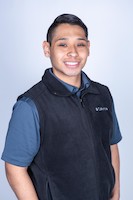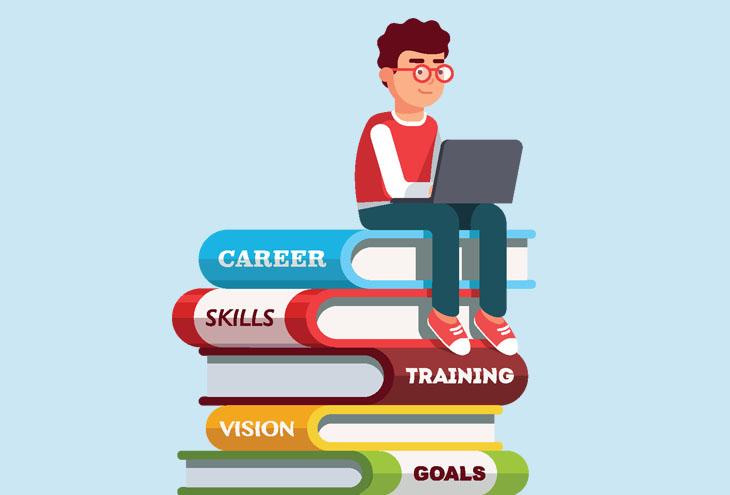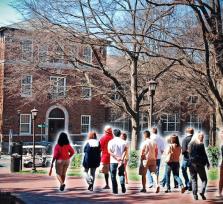Have you ever looked at a student who’s known for getting As and wondered, “How do they do it?” When you’re not the A student — but you’re trying to be — every little insight can help. Top students don’t just inherently know everything, they’ve also refined their study skills and know how to use their time effectively. The best part is, you can learn the same study habits they use to get those straight As!
Focus on Studying
This may seem obvious, but if you stop to think about it, you’ll probably realize that you multitask when you’re studying. If you’re looking at your phone, checking email, or thinking about what you’re going to wear tomorrow, you’re not focusing on the task at hand. Multitasking not only splits your focus, it can slow you down because you’re forcing your brain to switch from one thing to another. Multitasking won’t help you get better grades, so don’t do it. Focus on what you’re supposed to be studying without distractions, and you’ll find your study sessions are much more effective.
Practice Tests
Practice tests can be an incredibly useful tool. This doesn’t mean you have to create a full science test from scratch, it just means you need to regularly test yourself on the material you’re learning. This can be achieved with flashcards, completing problems or questions at the end of a chapter, or asking a friend to quiz you. Practice tests allow you to constantly review and gain additional time to process the material. You could also request old exams from your teachers to get a sense of their testing style. Practice can make perfect, as long as you commit to it!
Start Early
It may seem like you truly don’t have time to study until the night before the test. But at that point, most straight A students have been studying for days, if not weeks. Starting early is beneficial for a variety of reasons. It allows you to break your studying into smaller chunks, to go at your own pace, and to work with others to resolve any questions you have. It will also prevent you from feeling panicked right before the test and put you in a calmer frame of mind when you do take the test.
Know When to Pivot
Straight A students have their study techniques down, but that doesn’t mean they all use the same ones in the same ways. One student may find practice tests with flashcards to be effective. For another, it might be doing actual practice tests. As you try out different techniques, you’ll learn what does and doesn’t work for you. If something’s not working, it’s OK to pivot and try something else. The most important thing is that you develop techniques that work for you.
Ask for Help
Just because students get As doesn’t mean they didn’t have help. In fact, many of those students get As because they aren’t afraid to ask for help. Help can come in any form — extra time with the teacher, meetings with a tutor, going over notes and classwork with friends, or seeking additional resources online. All these forms of help can provide the clarification you need to better understand the material. The more you understand, the better off you’re going to be.
Studying is not easy, regardless of how you approach it. But you can make it more effective by adopting some of the same skills and techniques that top students use. Just remember that those students are working hard for their grades and if you do the same, you can become an A student too. Happy studying!
 On Topic
On Topic
Benny Jones, Choctaw and Cherokee, is a junior majoring in cell and molecular biology at Oklahoma’s Northeastern State University and serves as treasurer of the school’s AISES chapter. During his AISES affiliation, he has attended three National Conferences, and this year he went to both his first Leadership Summit and first Regional Conference. He says AISES has opened his eyes to opportunities outside his home state, including scholarships, internships, and other college programs. Jones highly recommends AISES membership to other students, saying, “Join AISES — go places!” In addition to being an involved member of AISES, Jones is also a high-achieving student. We asked him to share some of the study skills he uses to find success in the classroom.
What drives you when it comes to academic achievement?
What drives me is my future. My career goal is to be an endocrinologist. I know my academics are very important, so if I keep my eyes on the end goal, I know I can get there. I do this by looking at where I started and where I’m ultimately headed. I try my best to not focus too much on where I am right now because I know life can take us down different paths, with trials and errors along the way. So I stay focused on my future and my goals.
How do you prioritize your schoolwork?
I prioritize my work based on the difficulty of the class and assignment due dates because higher-level classes require more hours of studying after class compared to lower-level classes.
How much do you depend on technology to complete your schoolwork?
Most of my classes don’t require a textbook unless it’s needed for reference. I use many devices, including computers, calculators, and my cell phone on occasion. I use these to complete my assignments, prepare for tests, and work on other projects.
What digital study aids do you use?
Beyond the resources my teachers provide, I use Khan Academy and sometimes Quizlet.
Do you ever turn to classic “pen and paper” techniques, such as making flashcards or rewriting class notes?
I use flashcards when I’m trying to remember specific material (definitions, organic molecules, amino acids, and the like). After I listen to a lecture, I will go back and rewrite my notes or even the PowerPoint slides if available. For some reason, when I write it out I tend to remember the material better.
When do you access additional resources or seek extra help from teachers?
I ask for help whenever I don’t understand the material.
What is your typical study routine when preparing for exams? How far ahead do you begin? Do you take breaks?
I’ll begin studying and preparing about a week or two before the exam, depending on how difficult the exam is going to be or how heavy the lecture was beforehand. My studying routine is pretty simple. I’ll study for 30 minutes, then take a 10- to 15–minute break and repeat that cycle as long as I can study for that day.
How do you know you’re fully prepared to ace a test?
If after I read through my notes I can quiz myself and answer correctly without looking at my notes, I know I’m fully prepared.














